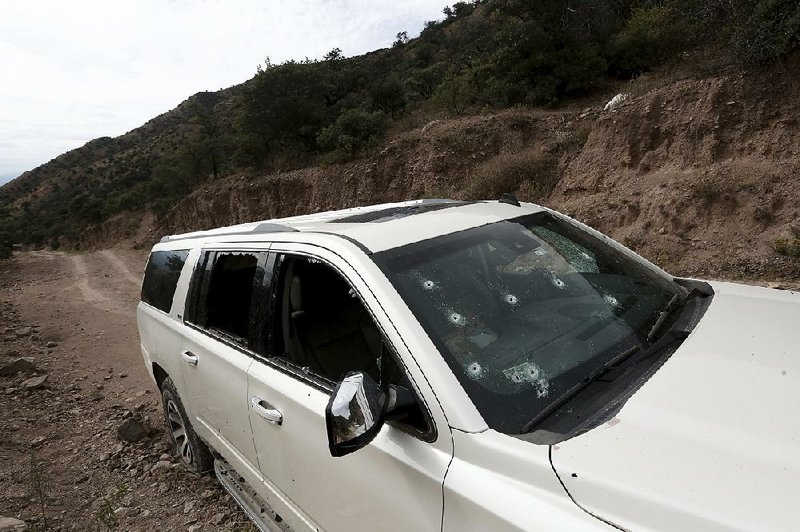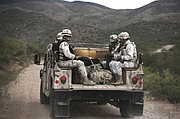MEXICO CITY -- President Andres Manuel Lopez Obrador on Wednesday again rejected U.S. suggestions he adopt more aggressive security policies after the killing of Mormons in northern Mexico, saying that approach has been a "disaster" in the past.
The killings Monday of three women and six children of the extended LeBaron family -- dual U.S.-Mexican citizens -- has raised pressure on Lopez Obrador's leftist government, which has pledged to use social programs to address the root causes of violence.
"It's unfortunate, sad, because children died. This is painful," Lopez Obrador said during his regular morning news conference Wednesday. "But trying to resolve this problem by declaring a war? In our country, it's been shown that this doesn't work. This was a disaster."
He was referring to the U.S.-backed offensive against drug groups that began in 2006, with the deployment of the Mexican army to battle organized-crime groups. Around 200,000 people have died in violence related to the conflict.
[Video not showing up above? Click here to watch » https://www.youtube.com/watch?v=yEEoBBRlako]
Mexico continues to work closely with the U.S. government in pursuing drug kingpins. President Donald Trump, however, suggested a more aggressive approach Tuesday, tweeting that "this is the time for Mexico, with the help of the United States, to wage WAR on the drug cartels and wipe them off the face of the earth. We merely await a call from your great new president!"
Other American politicians also have expressed alarm at the surging violence south of the border.
Sen. Tom Cotton, R-Ark., said Tuesday that "the Mexican government can't handle this."
The Mexican leader's strategy "may work in a children's fairy tale," Cotton told Fox News. "But in the real world ... the only thing that can counteract bullets is more and bigger bullets."
Lopez Obrador responded that Cotton's comments reflected "his vision."
"We respect it, but we don't share it," the president said.
Mexican authorities noted Wednesday that the bullets used in the attack were .223-caliber, produced by Remington, a U.S. manufacturer. Those bullets are typically used in M-16 and AR-15 rifles.
Foreign Minister Marcelo Ebrard said Wednesday that all results of the investigation would be provided to U.S. authorities, since the case involves American citizens. He said Mexico was open to accepting assistance from the FBI. "The extent of the participation by the FBI or other U.S. institutions [in the investigation] will depend on what the attorney general's office determines," he said.
The government has said that Monday's attack may have been a case of mistaken identity, with an organized-crime group thinking the families' SUVs belonged to a rival. Some relatives of the victims have rejected that idea, saying that the attackers realized the victims were women and children.
The eight children, some mere infants, who survived the ambush, not only escaped the drug cartel gunmen who killed their mothers but managed to hide in the brush, with some walking miles to get help despite grisly bullet wounds.
Devin Blake Langford, 13, one of the few uninjured young people, quickly took charge during the attack, eventually walking about 14 miles back to La Mora, where the families lived, for help, said Kendra Miller, a relative.
"After witnessing his mother and brothers being shot dead, Devin hid his six other siblings in the bushes and covered them with branches to keep them safe while he went for help," according to the relative's account. "When he took too long to return, his 9-year-old sister left the remaining five to try again."
That girl, Mckenzie Rayne Langford, walked for hours in the dark before she was found several hours after the other children were rescued.
Altogether, the youngsters were on their own from about 11 a.m. until about 7:30 p.m., when they were rescued. Relatives from La Mora tried to reach them before that but were turned back by gunfire from the cartel gunmen.
In recordings of calls between the rescuers, they can be heard debating whether to risk more lives or wait an hour or two for Mexican army troops to arrive.
What they saw when they found the children was terrifying.
Cody Greyson Langford, 8, had been shot in the jaw and bled profusely. Another girl had been shot in the foot and the back.
While drug-related violence has been raging for years in Mexico, the attack underscored the cartels' increasing indifference to the killing of children as collateral damage.
In August in Chihuahua, cartel gunmen fired 123 bullets at a man and also killed three girls, ages 4, 13 and 14. In June, a young boy was killed along with his father in Sonora. In July, a 10-year-old was killed during a robbery in Puebla state.
Officials said Tuesday that a suspect was arrested in the border city of Agua Prieta with assault rifles, but they later said the suspect apparently had not been involved in the ambush.
Information for this article was contributed by Mary Beth Sheridan of The Washington Post; and by Peter Orsi, Mark Stevenson and Brady McCombs of The Associated Press.
A Section on 11/07/2019

